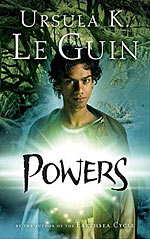
![]() Emil
Emil
1/30/2012
![]()
Powers is the third book in The Annals of the Western Shore, a YA series, with Gifts and Voices preceding it, and the only one that can be read as a stand-alone novel (hence my review for the GMRC, although Voices is to me the more accomplished and solid book of the series). However, the ending will be much more meaningful if all three were read in sequence. The books are loosely connected by a couple of characters, Orrec and Gry - we meet them as children in Gifts, and finally as adults in the final chapter of Powers. The separate stories are set in geographically dispersed areas of the Western Shore and concerns characters with different magical abilities, or gifts. The gifts are what make the families of the Uplands different, and even feared as witches by Lowlanders.
Le Guin is in familiar territory when telling Gavir's story. Like the previous books, the narrative is told from the first-person perspective. Gavir is the house slave of a wealthy, cultured and relatively enlightened and benign family in a town called Arcamand. He has two gifts, the ability to see events that have not yet happened, as a "memory," and the ability to remember anything he has read, able to recite the complete story verbatim. One is clearly supernatural, the other, arguably, not. In the end, though, the magical abilities are less important than the social circumstances of the characters. A thread seems to run through the series: a reluctance, perhaps even a fear, to use these gifts. The question is one of power and the consequences of its use and misuse and of choice. Towards the end, when Gavir is tutored by Dorod, this choice becomes brutally clear: control and use the power and accept the cruelty that it brings, or find another way. Wisely, early in the book, Gavir's sister convinces him to never reveal his abilities. It is not a spoiler to reveal that Gavir does find another way.
Initially all is well. Gavir is truly happy and content with life, albeit a life badly distorted by the mechanisms of organised slavery. The first sections of the book is clearly recounted by a priviliged slave living in far better conditions than generally afforded his kind, even to the extend that he may go to school. With subtelty that's almost cogent, Le Guin unravels the true nature of the oppressive society, showing just how capricious the amity of the household can be, and how utterly dangerous Gavir's trust in his owners is. As his character develops, Gavir gradually comes to understand and accept even the betrayal of his trust. At this point Le Guin demonstrates yet again the range and depth of her artistry as Gavir informs us:
Where Gavir once may have believed that a social order of master and slave is the natural way of things, he slowly begins to percieve the true injustice of it, and when a horrible tragedy strikes, his life begins to rapidly change. Almost by accident Gavir escapes his slavery, and the narrative transforms into a compelling and riveting journey with equally compelling characters. When Gavir takes to the road, heading back to his people, it's the beginning of his coming of age journey. He must try to understand the nature of his own talents, but always his past as a slave haunts him, like a shadow. Hoby, who once bullied him before he made his escape, ultimately after many years' searching, tracks him down. The river crossing explained in a few short paragraphs remains for me one of the most touching and unforgettable narratives in all of Le Guin's work, a symbolic crossing perhaps every child is destined to make.
Le Guin's metaphors and imagery and insights are no less powerful, no less beautiful. She can still create myths.
The final two chapters of Powers is just overwhelmingly moving, simply spectacular, and the reason why this series is now one of my favourites, alongside Earthsea. Gavir becomes a character to really like, endearing and respected, not only because of his love for scholarship and reading, but because of Le Guin's remarkable and canny ability to remember and depict the crises and concerns of adolescence that could easily have been my story. Attentive readers will meet themselves and, sadly, the worst of the societies we live in.
Powers still resonates with me, long after I finished it. Le Guin's familiar subjects and motifs are still present, as the all-encompassing political concern for the protection and the nurture of human freedom in all aspects of human life, and the urgent need for the creation of a real human community. This is a message I don't mind young adults hearing. There is no miraculous conversion of slave owners, renouncing their evil, oppressive ways. Like life, there are no easy answers, but in the end, hanging on, things do get better. I, for one, do believe that.
Highly recommended, not only for young adults.